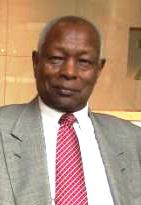Darfur former governor blames conflict on marginalisation
November 6, 2007 (SIRTE, Libya) — Ahmed Ibrahim Diraige is a man who has experienced a world of change in his home Darfur. Now in his 70s, he has seen the tribal chiefdom system give way to a Khartoum-based government that he holds responsible for the neglect of the region and the subsequent slide into conflict.

He has been involved in politics for most of his life; with the government in his early career during the 1960s, to his role as leader of one of the rebel groups taking part in peace talks, mediated by the African Union (AU) and the United Nations (UN), in the Libyan coastal town of Sirte.
Understanding the dynamics of the conflict in Darfur can be a daunting task, and Diraige’s political career illustrates the complexity of the situation. Although he now lives in Europe, his political influence back home remains strong and he maintains that his group, the Sudan Federal Democratic Alliance (SFDA) has troops on the ground.
After Sudan gained independence in 1956, traditional administrative chiefdoms were replaced with regional local administrations, so when Diraige returned from law school in the early 1960s, he faced a new system of governance.
He quickly became involved in leadership in one form or another, serving as governor of Darfur between 1961 and 1963, and in 1964, founding and heading the Darfur Development Front. He was a member of parliament between 1965 and 1969 when Sadiq Al-Mahdi was prime minister, and served as minister for labour and cooperatives.
As the head of the Umma Party, he was leader of the opposition in parliament between 1968 and 1969. He left for the Gulf after Jaafar Mohamad Numeiry’s coup in 1969, where his legal expertise was employed in the development of a constitution for the United Arab Emirates.
Diraige has been part of the Eritrea-based National Democratic Alliance (NDA) – a coalition of Sudanese political parties – since 1995. His group is distinct from the two better known Darfur rebel movements – the Justice and Equality Movement (JEM) and the Sudan Liberation Army/Movement (SLA/M), which have been active since 2003 when the conflict began and have since split into several other factions.
Key JEM and SLA/M groups boycotted the start of the Sirte peace talks, although Diraige’s group and seven other factions were represented. The AU-UN mediators want all factions on board – hoping for greater representation in early December for the “substantive negotiations” phase of the talks.
Previous attempts to bring peace in Darfur have failed. In 2006, the AU mediated talks between the Sudanese government and the Darfur rebel groups. However, only one group signed the Darfur Peace Agreement in Abuja, Nigeria – the SLM led by Minni Minnawi, who has since accepted a position as adviser to President Omar El-Bashir.
Speaking to IRIN in Sirte, Diraige said he believes the rebel groups will come together this time to present their positions and find a way forward.
He blamed the lack of water, inadequate grazing land and increased desertification for increased tensions between farming and livestock-keeping communities and exacerbating the conflict.
“It is not a conflict pitting Africans against Arabs; both these people co-existed for centuries in Darfur; they helped each other during the wet and dry seasons and had a system under which the resources were accessible to all without resorting to violence,” he said.
The reality, he added, is that communities of both African and Arab descent in Darfur have been marginalised by successive Khartoum-based governments.
“It is a fact that the government has for many years been ruled by the people from the north who call themselves Arabs,” he said. “Years of neglect have led to the marginalised taking up arms, and this is where we are in Darfur.”
In his address during the opening of the talks in Sirte on 27 October, Libyan President Colonel Muammar Gaddafi’s speech appeared to both back the government’s position on Darfur and support the rebel groups’ efforts to fight marginalisation.
Diriage said: “Gaddafi’s speech gave the impression that the Darfur problem was tribal, and at one time he have the impression that he is biased towards the government, but I think he was passing a message really that, on principle, he is against foreign intervention in a country’s affairs but at the same time saying that when people feel their governments had let them down they must stand up against it.”
Turning to the issue of self-determination, Diraige said he believed that Darfur should remain part of Sudan, contrary to views held by some of the factions in Sirte.
“It is a fact that Darfuris are in all parts of Sudan; the people of Darfur fought against the secession of South Sudan, it is important that we remain part of Sudan,” he said.
Diraige said the Sirte talks provide a “real chance” for the resolution of the key issues in the Darfur crisis – marginalisation and the return/compensations of the internally displaced and refugees.
(IRIN)
